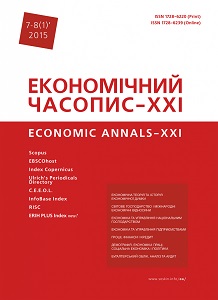Розвиток економіки України: «ресурсне прокляття» по-українськи чи наслідок постсоціалістичної трансформації
Ukrainian economic development: «resource curse» or post-socialist transformation consequence
Author(s): Serhii Kolodiy, Mykola Rudenko, Lesia HariahaSubject(s): Economy
Published by: Institute of Society Transformation
Keywords: Economy of Ukraine; GDP; Ferrous Metallurgy; Crude Steel; Crops; Post-Socialist Transformation; «Resource Curse»; Institutional Transformation
Summary/Abstract: Introduction. In accordance with the orthodox economic theory, the natural resources availability in a country is one of the main factors of the country’s economic development. Thus, in the period of post-socialist transformation the country which has natural resources may come to the formation of the economy with the «resource curse». Purpose. To research the impact of resource industries, such as ferrous metallurgy and grains and leguminous crops growing on the Ukrainian economy and to ground the necessity for the diversification of industries and institutional reforms realization. Results. The authors analyze the interdependence of the main economic indicator – Gross Domestic Product (GDP) of Ukraine and the resource industries production: ferrous metallurgy and grains and legumes growing. It is determined that the relationship between GDP and steel products manufacturing is strong enough, whereas a significant dependence of GDP on grains and legumes growing has been refuted. The signs of the «resource curse» in the post-socialist transformation have been discovered, namely, the existence of a considerable dependence of GDP from the steel products manufacturing. The authors have shown the need to diversify the sectors of Ukrainian economy to overcome the negative effects of the «resource curse». Conclusion. It is important to support the diversification of industries at the state level for the further implementation of the necessary institutional changes to avoid the negative consequences of the «resource curse» because some signs of this phenomenon are observed in the national economy today.
Journal: Економічний часопис - ХХІ
- Issue Year: 152/2015
- Issue No: 07+08 (1)
- Page Range: 36-39
- Page Count: 4

